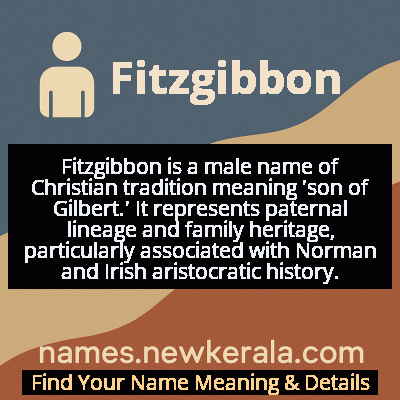Fitzgibbon Name Meaning & Details
Origin, Popularity, Numerology Analysis & Name Meaning of Fitzgibbon
Discover the origin, meaning, and cultural significance of the name FITZGIBBON. Delve into its historical roots and explore the lasting impact it has had on communities and traditions.
Name
Fitzgibbon
Gender
Male
Origin
Christian
Lucky Number
2
Meaning of the Name - Fitzgibbon
Fitzgibbon is a male name of Christian tradition meaning 'son of Gilbert.' It represents paternal lineage and family heritage, particularly associated with Norman and Irish aristocratic history.
Fitzgibbon - Complete Numerology Analysis
Your Numerology Number
Based on Pythagorean Numerology System
Ruling Planet
Moon
Positive Nature
Diplomatic, friendly, artistic, empathetic.
Negative Traits
Over-sensitive, moody, indecisive, prone to self-pity.
Lucky Colours
Green, cream, white.
Lucky Days
Monday.
Lucky Stones
Pearl, moonstone.
Harmony Numbers
1, 3, 4.
Best Suited Professions
Diplomats, mediators, caregivers, artists.
What People Like About You
Cooperative spirit, friendliness, artistic talent.
Famous People Named Fitzgibbon
Thomas Fitzgibbon
Military Officer
British Army officer awarded the Army Gold Cross for service in the Peninsular War
James Fitzgibbon
Military Leader
Key figure in Upper Canada's defense during the War of 1812
John Fitzgibbon
Politician/Jurist
Lord Chancellor of Ireland and influential in the Act of Union
Michael Fitzgibbon
Rugby Player
Professional rugby union player who represented Ireland internationally
Name Variations & International Equivalents
Click on blue names to explore their detailed meanings. Gray names with will be available soon.
Cultural & Historical Significance
The name also carries significance in the context of Irish resistance and adaptation. During the Cromwellian and Williamite periods, various branches of the Fitzgibbon family experienced different fates—some maintaining their lands and status by conforming to English authority, while others suffered land confiscation for supporting the Catholic cause. The most famous Fitzgibbon, John Fitzgibbon, 1st Earl of Clare, as Lord Chancellor of Ireland, played a controversial role in promoting the Act of Union between Great Britain and Ireland in 1800, making the name symbolic of the complex political choices faced by the Irish aristocracy during this turbulent period. This historical legacy makes Fitzgibbon a name that encapsulates the entire sweep of Anglo-Irish relations from the Norman conquest to the modern era.
Extended Personality Analysis
The Fitzgibbon name is associated with a personality profile characterized by leadership, intellectual acuity, and diplomatic skill. Historically, bearers of this name have demonstrated strategic thinking and political savvy, qualities necessary for navigating the complex social landscape of Norman Ireland and later Anglo-Irish relations. There's a strong sense of family pride and tradition associated with the name, often manifesting as protectiveness toward one's heritage and a commitment to maintaining family honor. The military background of many Fitzgibbons suggests courage, loyalty, and the ability to command respect in challenging situations.
Modern individuals with this name often exhibit a blend of traditional values and contemporary adaptability, reflecting the name's historical journey through different cultural contexts. They tend to be educated, articulate, and politically aware, with a natural inclination toward leadership roles. The name also suggests resilience and the ability to overcome adversity, given the family's history of surviving political upheavals and maintaining status through changing regimes. There's often a sophisticated, somewhat aristocratic bearing associated with the name, combined with practical intelligence and the ability to bridge different social or cultural groups—a legacy of the Fitzgibbon role as mediators between Norman, English, and Irish societies throughout history.
Modern Usage & Popularity
In contemporary usage, Fitzgibbon remains predominantly a surname, though it has seen occasional use as a distinctive first name, particularly in families seeking to honor their Norman-Irish heritage. The name maintains its aristocratic connotations and is often associated with educated, professional families. While not among the most common surnames, it has stable representation in Ireland, the United Kingdom, and countries with significant Irish diaspora populations like the United States, Canada, and Australia. The name's visibility is enhanced by the prestigious Fitzgibbon Cup, the premier intervarsity hurling competition in Ireland, which ensures its continued recognition in Irish sporting and academic circles. Modern bearers of the name can be found across various professions, with notable representation in law, academia, business, and sports, continuing the tradition of achievement associated with the name. The trend of using surnames as first names has led to increased occasional use of Fitzgibbon as a given name, particularly among families with strong connections to Irish history or Norman heritage.
Symbolic & Spiritual Meanings
Symbolically, Fitzgibbon represents the enduring power of lineage and the complex interplay between different cultural traditions. The name serves as a living monument to the Norman impact on Irish society, symbolizing both conquest and integration. The 'Fitz' prefix carries symbolic weight as a marker of aristocratic lineage and paternal descent, representing continuity and the transmission of family legacy across generations. The Gilbert root symbolizes brightness, promise, and trust—qualities that have been associated with leadership and diplomacy throughout the name's history. Collectively, the name embodies the idea of cultural synthesis, representing how different traditions can merge to create new identities while preserving elements of their origins. It also symbolizes resilience and adaptation, as the family maintained its status and identity through centuries of political and social change. In a broader sense, Fitzgibbon represents the aristocratic ideal of noblesse oblige—the concept that privilege carries with it social responsibility—and the intellectual tradition of educated leadership that has characterized many bearers of the name throughout history.

